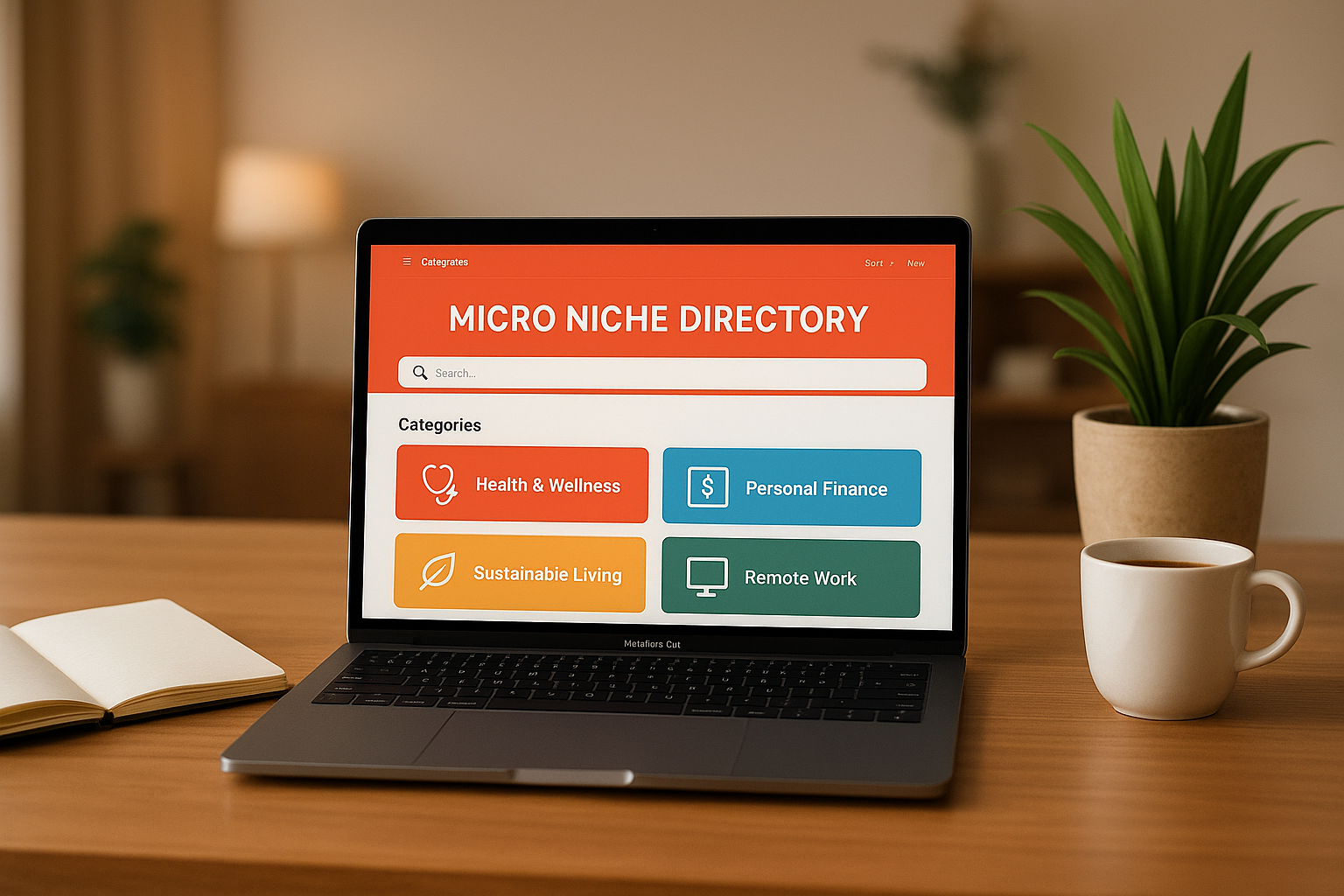4 Monetizable AI Blog Ideas for Beginners

4 Monetizable AI Blog Ideas for Beginners
Here’s how:
- Pick a profitable niche: AI personal finance tools, smart home automation, or AI marketing for small businesses are great starting points.
- Automate content creation: Tools like Jasper and Grammarly can write and edit posts in minutes. Surfer SEO handles keyword research and optimization.
- Monetize smartly: Use affiliate marketing, sell premium content, or offer AI-generated products like templates and guides.
- Boost traffic with SEO: AI tools like Semrush and Clearscope help you rank higher on Google.
AI takes care of the hard stuff - content, SEO, and monetization - so you can focus on growing your blog. Ready to start? Dive into the details below!
1. AI Niche Selection
Picking the right niche is the first step toward turning your passion into profit. Aligning your interests with market demand is key, and here are three AI-focused niches that offer promising opportunities for beginners.
AI-Powered Personal Finance and Investment Tools
Personal finance remains a highly profitable blogging area. With AI, you can explore tools like budgeting apps, robo-advisors, and automated investment platforms. These tools not only provide fresh topics to write about but also help readers manage their money more effectively. You can earn through affiliate links, sponsorships, or even paid guides while delivering practical financial advice.
AI Home Automation and Smart Living
The smart home market is booming, and homeowners are eager for solutions that make life easier and cut energy costs. Covering AI-powered devices like security systems, smart thermostats, voice assistants, and automated lighting can attract a targeted audience. For example, writing about how AI thermostats can lower energy bills taps into a pain point many people face. Using AI-driven keyword strategies can also help boost your website traffic. This niche appeals to readers ready to invest in smarter, more efficient living solutions.
AI Marketing Tools for Small Businesses
Small businesses are always looking for affordable ways to grow, and AI marketing tools are a game-changer. From email automation and social media scheduling to chatbots and content creation, these tools can help businesses save time and generate results. Highlight how AI tools can lead to 67% more leads compared to traditional methods. Many companies in this space offer recurring affiliate commissions, making it a great niche for building a steady income stream while empowering your audience with actionable strategies.
These niches not only show strong market demand but also leave room for you to carve out a unique angle. Dive into these areas as you prepare to streamline content automation in the next step.
2. Content Automation
Streamlining your content creation process is no longer a luxury - it’s a necessity. AI tools have revolutionized how marketers produce content, turning tasks that once consumed hours into quick, efficient workflows. With 75% of marketers already leveraging AI - and considering that a 500-word post traditionally takes about 4 hours to create - automation has become crucial for staying ahead in the game. Here’s how AI can simplify your drafting, editing, and distribution processes.
AI-Powered Draft Generation and Editing
AI tools like Jasper and Copy.ai can kickstart your content creation by generating drafts and outlines in minutes. Jasper, for instance, offers its Creator plan starting at $49 per month and boasts an impressive 4.7/5 star rating on G2, making it a solid choice for beginners. These tools can craft blog post structures, write compelling introductions, and even develop detailed sections based on your content briefs.
Once your draft is ready, tools like Grammarly step in for AI-powered editing. Grammarly helps refine your content, ensuring clarity, grammatical accuracy, and alignment with your brand’s tone. By letting AI handle the heavy lifting, you can focus on polishing the final output. As Dave Birss, an AI expert, puts it:
“It’s the people who understand how to collaborate with AI that will have a real advantage over the next few years”.
Automated SEO and Keyword Integration
Beyond drafting and editing, AI tools like Surfer SEO simplify the often time-consuming process of SEO optimization. Starting at just $19 per month, Surfer SEO offers automated keyword research and content optimization. It analyzes top-ranking pages in your niche and provides actionable recommendations for keyword placement, content length, and structural improvements. It doesn’t stop there - it can also optimize meta descriptions, generate schema markup, and create XML sitemaps, giving you a comprehensive SEO solution.
For those using no-code platforms like Lideroo, these SEO tools integrate seamlessly with built-in optimization features. Lideroo combines AI-driven content creation with automated SEO recommendations, enabling a smooth workflow that handles both content production and optimization in one place.
Content Repurposing and Distribution Automation
AI tools also help you extend the life of your content by repurposing it for different platforms. For example, Rytr specializes in short-form content creation using pre-designed templates. Its free plan includes 10,000 characters per month, with unlimited plans starting at $9/month. You can use Rytr to transform a single blog post into social media captions, email snippets, or even video scripts.
To take things further, tools like Arvow automate the publishing process by directly posting content to your blog. This eliminates the need for manual scheduling and ensures consistent delivery. Vijay Navaluri of Supervity AI highlights the benefits of these tools:
“AI helps reclaim time by automating repetitive tasks, allowing you to focus on growth and innovation, proving its real-world impact on small businesses”.
3. Monetization Strategies
Transforming your blog into a revenue-generating platform is all about using the right strategies. With AI, you can scale your content production and open doors to multiple income streams that might otherwise feel overwhelming to manage.
Affiliate Marketing with AI Precision
Leverage AI tools to pinpoint lucrative affiliate programs and craft targeted promotional content.
Affiliate marketing is a booming industry, valued at over $17 billion globally in 2024, and AI is making it more accessible than ever. AI-powered analytics can help you understand your audience’s preferences, shopping habits, and interests, enabling you to recommend affiliate products that truly resonate with them.
Take freelancer Maya Gross, for example. She earns $5,000 monthly by offering AI-powered Instagram post creation services through Fiverr and referrals. By using AI to understand her clients’ challenges, she promotes tools and services that directly address their needs.
AI doesn’t just simplify the process - it can increase your affiliate revenue by up to 30% through smarter targeting and personalized recommendations. Tools like Scaleo’s Anti-Fraud Logic™ even use machine learning to optimize affiliate traffic, improving conversion rates.
Once you’ve mastered affiliate marketing, you can expand your monetization efforts with exclusive content.
Premium Content and Subscription Models
Use AI insights to create exclusive, high-value content that goes beyond your free offerings.
Premium content is all about delivering deeper insights and actionable advice. As John Caruso, Director of Business Development at Vendilli Digital Group, puts it:
“Premium content must deliver unique insights and actionable advice”.
A great example is Slate’s Slate Plus membership, which gained 9,000 paying subscribers in its first year by charging $50 annually for exclusive content. For bloggers, premium offerings could include detailed AI tool reviews, step-by-step automation tutorials, or personalized strategies.
Platforms like Lideroo make it easy to implement subscription models with built-in monetization tools and payment systems. You can offer basic AI tips for free while charging for premium features like custom workflows, one-on-one consultations, or exclusive recommendations.
AI-Generated Digital Products and Services
Turn your AI expertise into digital products to create passive income streams.
Building on targeted marketing and premium content, you can diversify further by selling AI-generated products. The success of “Ben’s Bites”, an AI newsletter that grew to over 100,000 subscribers in just six months, highlights the demand for AI-focused content. This growth attracted sponsorships, proving that AI expertise can be monetized in multiple ways.
You could sell AI-generated templates, guides, or even artwork. For instance, one YouTuber earns $2,910 a month selling AI-generated wall art on Etsy. Bloggers can follow suit by offering products like social media templates, email sequences, or content calendars tailored to their audience.
Consistency and a value-driven approach are key. As Nikulsinh Rajput explains:
“You don’t need to code. You don’t need to be an expert. You just need to know how to combine free AI tools smartly”.
4. SEO Optimization
Once your blog is monetized, the next step is to make it easier for people to find. That’s where SEO comes in. Good SEO turns your valuable content into a traffic magnet. And with AI, you can take your keyword strategy to the next level.
AI-Powered Keyword Research and Content Optimization
Use AI tools to uncover top-performing keywords and fine-tune your content for better visibility in search results.
AI has changed the game for bloggers, making SEO easier to grasp and implement. In fact, 68% of businesses have reported improved SEO performance thanks to AI-driven tools. The secret lies in automating tedious tasks like keyword research while keeping the human element that search engines reward.
Take STACK Media as an example. In March 2025, they saw a 61% jump in website traffic after adopting AI-focused SEO strategies.
Tools such as Semrush provide detailed keyword research and tailored suggestions. Other platforms like Surfer SEO ($99/month) and Clearscope ($189/month) specialize in content optimization by analyzing the top-ranking pages and offering actionable insights.
Start with basic seed keywords to discover related long-tail keywords that match specific user searches. AI tools can then group these keywords by relevance and intent, ensuring your content aligns with what people are actually looking for.
For an even smoother process, platforms like Lideroo integrate AI-powered SEO tools to handle tasks like generating meta tags, creating XML sitemaps, and adding schema markup - all without requiring coding skills. This makes managing SEO much easier while keeping your content optimized.
While Google emphasizes the importance of content quality over its origin, it still recommends human oversight. Combining AI’s efficiency with human review helps you create well-optimized, high-quality content that performs well in search rankings.
Conclusion
Starting a profitable AI-powered blog has never been more accessible. Thanks to the rise of AI tools and no-code platforms, even those without technical expertise can build and monetize blogs with ease. As Leeway Hertz puts it, “The combination of AI and no-code tools democratizes technology, making it easier for anyone to create and implement innovative solutions without waiting for traditional development timelines”.
The benefits are clear. According to McKinsey, no-code platforms can accelerate software development by up to 90%. For bloggers, this means quicker content creation, automated SEO strategies, and efficient monetization workflows.
Take Christopher Kokoski, for example. In 2023, he earned over $10,000 through AI blogging by exploring diverse niches like travel, technology, and healthcare. His approach was straightforward yet effective: Google auto-complete for keyword research, ChatGPT for drafting content, DALL-E and Canva for custom visuals, and RankMath for SEO. He monetized his blog with display ads via Ezoic and Mediavine, as well as affiliate marketing.
The trick is to view AI as a powerful assistant rather than a replacement. Ryan Robinson explains it best: “AI is the cheapest, fastest-skilled assistant in human history. To not experiment with these tools yet, is really missing a once-in-a-generation opportunity”. However, as Yvonne Ivanescu wisely notes, “AI is making blog management easier than ever. But here’s the thing – AI is a sidekick, not the star. We still need writers who bring personality, experience, and creativity, because the best blogs aren’t just smart; they’re human, too”. This balance between AI efficiency and human creativity is what separates good blogs from great ones.
To get started, begin automating simple tasks like follow-up emails or setting up an AI-powered chatbot. Choose a profitable niche using tools like Google Trends, and consider platforms like Lideroo, which combine AI-powered SEO with no-code simplicity. Use AI for drafting and outlining, but ensure your unique voice shines through in every post.
With 64% of no-code users believing it will be the go-to choice for developers by 2030, there’s no better time to dive in. In just a few weeks, your AI-driven blog could be up, running, and earning.
The tools are ready, the methods are proven - so the real question is, when will you take the leap?
FAQs
What are some easy-to-use AI tools for creating blog content and improving SEO?
If you’re new to blogging, there are plenty of beginner-friendly AI tools that can make content creation and SEO optimization a breeze. Jasper is a standout option, known for generating keyword-optimized, engaging articles quickly. It’s ideal for beginners aiming to draw in readers without spending hours on writing. Another powerful tool is Semrush, which offers a Content Toolkit packed with AI-driven SEO insights. It helps you discover effective keywords and draft posts with ease. Lastly, AirOps is worth considering - it integrates smoothly into your workflow, enabling you to produce polished, SEO-friendly content on a larger scale. These tools not only simplify the blogging process but also help increase your blog’s visibility, even if you’re just starting out.
What are the best ways to monetize an AI blog using affiliate marketing and premium content?
To make money from your AI blog using affiliate marketing, start by partnering with affiliate programs that align with your blog’s focus. Create engaging content, such as reviews, tutorials, or how-to guides, that naturally weaves in these products or services. Leverage AI tools to improve your content’s quality and optimize it for SEO, helping you attract more visitors and increase conversions. The trick is to address specific reader challenges - this builds trust and opens up more sales opportunities.
For premium content, think about offering exclusive resources like in-depth articles, e-books, or webinars behind a paywall. Another option is to introduce a membership model, giving subscribers access to valuable tools, insights, or special content. Make sure to emphasize the benefits of subscribing to encourage sign-ups. This strategy not only provides a steady income stream but also positions your blog as a reliable resource in the AI niche.
What are the advantages of starting an AI-focused blog in niches like personal finance or smart home automation?
Starting an AI-focused blog in areas like personal finance or smart home automation can be a smart move for several reasons:
- Constant Interest: Personal finance remains a go-to topic since people are always looking for tips to save, invest, or manage their money better. On the other hand, smart home automation is on the rise as more households embrace AI-driven devices.
- Varied Income Opportunities: These niches open the door to earning through affiliate links, sponsored posts, or even selling your own digital products, like eBooks or online courses.
- Interactive Content: AI tools can elevate your blog by providing tailored advice or solutions, making your content more engaging and keeping readers coming back.
These topics are built to last, with AI advancements ensuring they stay relevant and profitable well into the future.


